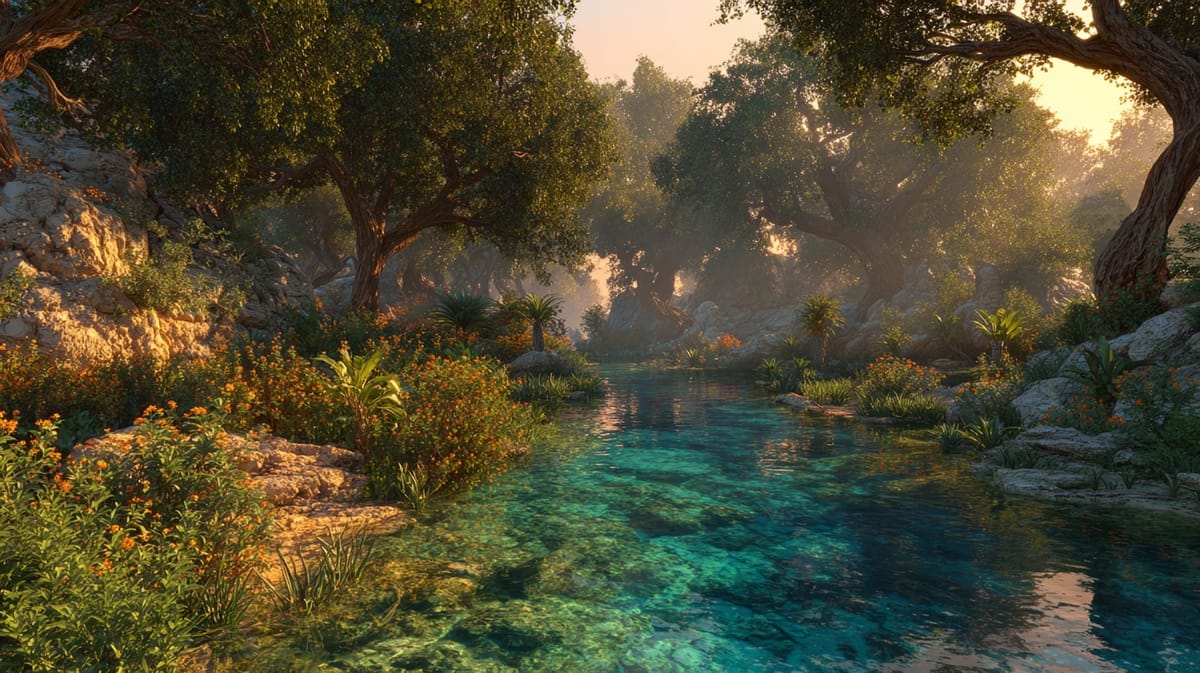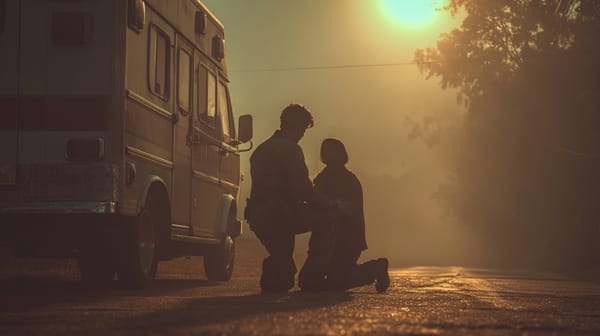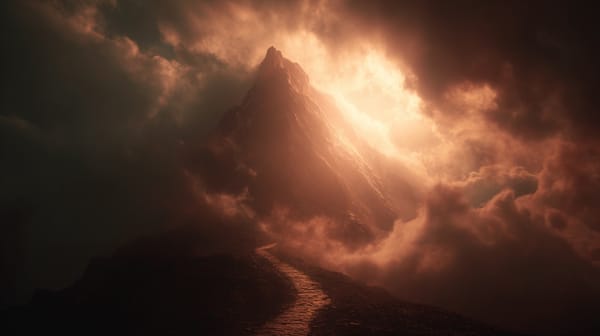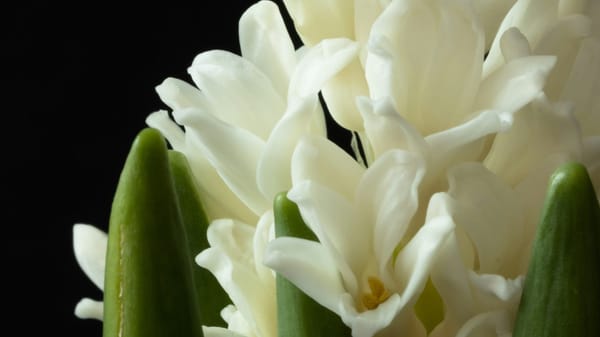Fairhaven Sermon 8-10-2025

Summary
In this week’s service, Rev. Peg Bowman began a new sermon series focusing on familiar Bible stories from childhood, examining their meaning for adults today. Starting with the story of creation in Genesis, she explored both chapters 1 and 2, highlighting the distinct perspectives each offers. Chapter 1 presents a grand, sweeping narrative of creation, while chapter 2 focuses on the details of life and relationships within the Garden of Eden.
Rev. Bowman delved into the historical context, noting that Genesis was likely written down during Israel's captivity in Babylon and drawing connections to the cradle of civilization, Mesopotamia. She emphasized that while debates exist regarding interpretations alongside evolutionary theory, Genesis reveals God's powerful word and the creation of humankind in God’s image. Ultimately, she encouraged listeners to envision the beauty and harmony of Eden as a model for restoring creation today, anticipating a future where God's vision is fully realized.
Transcript
Well, we have something new and different starting this morning for now and through the rest of the summer and probably well into a little bit of September as well. Pastor Dylan and I have taken a request. Dylan was asked for a sermon series on the stories in the Bible that we all learned as children and what they mean for us now as adults. Stories like the Tower of Babel, David and Goliath, Noah's Ark.
And what can we learn from all these today? And Dylan and I both, this is a fantastic idea, so we're going with it. So like I said, from now through September, and today I'm going to start at the very beginning with the story of creation. And so we'll take a look at this. Now in the book of Genesis, there are actually two creation stories.
There's Genesis chapter 1 and there's Genesis chapter 2. The first one in chapter one is very familiar. In the beginning, God created the heavens and the earth, and that chapter one goes on to describe how God created light and darkness and sky and sea and the moon and the sun and the earth and the stars. Genesis chapter 1 is like listening to a grand symphony or watching an epic movie.
It's a sweeping canvas of light and sound and life. And when we look at it in detail, it's really too much for our minds to take in. It's just gorgeous. But in chapter 2 of Genesis, there's another telling of the same story, but in a little bit more down-to-earth.
Chapter 2 focuses more on the living things, the creation of plants and animals and man and woman. And then in Chapter 3, we meet the serpent and we find out how evil came into the world. But that story is not for today. Today, I want to spend some time in the garden.
in the Garden of Eden before the fall. I'd like to take us there as much as it is possible for we imperfect humans to go back to that perfection. So come with me on the journey. And actually before our bus takes off to this journey, there are a couple points of history to know before we get there.
First off, the first book of Genesis, even though it's the first book, well, the whole book of Genesis, even though it's the first book of the Bible, was probably not the first book to be written down. Much of what we have in the first few books of the Bible was passed down verbally from generation to generation and then written down later. This does not in any way change its truthfulness. People down through the ages in all cultures memorized books in order to preserve the knowledge, and our contemporary society doesn't develop those memory skills anymore because we don't need to.
We have books. But most of human history, people did not have books, so they memorized and they were good at it. So the actual writing down of Genesis chapter 1 is believed to have happened when Israel was in captivity in Babylon, about the same time as the events of the book of Esther, as you recall that story. The reason for this is because Babylon is the location where the human race began.
In other words, Mesopotamia, y'all remember that from history class, right? Mesopotamia, the cradle of civilization, birthplace of human beings. In between the Tigris and the Euphrates, which is between the rivers, that's what Mesopotamia means, Meso-Middle-Potamia rivers. So in between the rivers..
. That's where civilization started. And so while the Jewish people were in Mesopotamia, they wrote down the history of that region, which included God's creation. Genesis chapter 2, on the other hand, is believed to have been written down much earlier, during the reign of King David, and this version of creation is more down to earth, like I said, focused on relationships.
God creates the things of earth using the dirt of earth, which God then shapes into plants and trees and animals and finally a human being. So chapter 2 shows how we, as human beings, are physically related to the earth and everything else on earth. In fact, the name Adam is taken from the Hebrew word for dirt, Adamah. So in our time in the 21st century, a lot of people debate the truth of these first two chapters of the Bible and they say the theory of evolution is the reality and that evolution disproves what's written in these two chapters.
Personally, I believe that evolution is just one of many tools in God's toolbox. And the concept of a day in Genesis chapter 1 is not a 24-hour day. It can't be because the sun and moon weren't created until day three. So Genesis chapter 1 is better understood like poetry rather than history.
The important thing in chapter 1 is that when God spoke, things happened. Where there once was nothing, now there was something. In fact, there was a lot of something. And the point is that God's Word is powerful.
God's Word makes things happen. And God's Word is enough to change the world and enough to change our lives. And so the one last thing that's important about Genesis 1 is that God made humankind in our image, as God says. And the word our implies that there's more than one personality in the Godhead.
This is our first introduction to what we will come to know as the Trinity: Father, Son, and Holy Spirit. People were created to be like God. Not to be God, but to be like God in that we also can create and build and enjoy relationships and work and rest and communicate. So many of the things that God does, we do.
So that's the foundational background that we need before taking off on this journey. Back to the beginning. And I should also mention that most of the time when pastors preach on creation, they preach chapter 1 because it is so beautiful. Okay.
But today, chapter 2, because there's a lot of good things going on here that are often missed because chapter 1 is so nice. All right, so Genesis chapter 2 starts on the seventh day and then recaps what's happened so far. So on the seventh day, God rested. And we've talked about the Sabbath before and how important that is, so I won't recap that now.
At this point in time, God has created the earth and the heavens and the stars and the moon and the sun and all the water on the earth and the dry land and the earth. But at the beginning of Genesis chapter 2, the living things haven't been fully defined yet. So the creation story sort of starts over again with a different focus, this time on life. So imagine the earth when it was brand new.
Huge ball of dirt with oceans and now in this chapter, rivers to water the earth. Okay, and by the way, I should mention when you read things in chapter 2, they're not And now in this chapter, rivers to water the earth. necessarily in chronological order. So I'm going to try to put them in chronological order today so those of you who are following in scriptures, this won't be in order.
All right, so first God created Eden, which is a large garden, to be home for the animals and for the people that God's about to create. God makes rivers to water the garden, the four rivers which God gives names to. Pishon and Gihan, we don't know exactly where those two are anymore. In spite of the descriptions that are given in chapter 2, people have not been able to identify them.
But the last two rivers, the Tigris and the Euphrates, the cradle of civilization, we know where that is. And so they are there to this day in the country of Iran. That's where human history started. God then created out of the dirt grass and trees and plants, some of the plants that produce food.
It's interesting that God creates all these things out of the dirt. And when we look at what plants are and what animals are, what people are made of, we're all made of the same stuff. God designed this creation so that everything living is intimately connected to the planet that we came from. God then creates a man and puts him in the garden.
And God tells the man that his assignment is to till and keep the garden. In other words, take care of the plants. And God is there to help as the man is figuring out how to do this. Do these plants need water? Amen.
Do they need more sunlight? Do they need to be moved? Do they need to be trimmed so that they can grow back some more? God teaches the man all these things about how to take care of creation. And the man enjoys doing all these things. Imagine for a moment what life would be like if we had never lost that innocence and that connection with the earth. We'd spend our days basically being gardeners and also caring for animals, but that's still to come yet.
This is not the same thing as farming. There is no need in those days for barns. There is no need to bring in a harvest. The garden produced fruits and vegetables and different kinds of grains all year round.
So the man would just go out and pick what he needed and then take care of the rest, take care of the plants. So the plants depended on the man for their survival, and the man depended on the plants for his survival. And as we extend this into human history, the survival of the human race has always depended on taking care of the land and the water, and then the animals when they came along. But again, it didn't feel like work back then.
any more than having a backyard garden feels like work today. It's like something we're created to do. And as I've often said, when we discover and do what God designed us to do, life is sweet. Life is good.
So this assignment to the first man has never been taken away. Taking care of creation is still our job today, given to us by God and inspired by God. And in that very first garden, God gave the man just one word of warning. He said, Don't eat any of the fruit of the tree for the knowledge of good and evil.
Anything else in the garden you can eat, just not from that tree. And for a long time, nobody did. For a long time, creation was perfect. And then God said, Well, it's not good for this man to be alone.
And so God knows, because God is never alone. God has Father, Son, Holy Spirit, so God is never alone. God knows it's not good for us to be alone. So God created us to join in this life of love and be part of it.
So God starts creating animals. And as God creates each animal, he brings it to Adam, and Adam gives the animal a name: monkey, hippopotamus, horse, sheep, dog, cat. I mean, can you imagine Adam's delight with each new animal, looking at it for the first time? Aardvark! Alligator, looking into the eyes of another living being, petting its fur or its scales or its feathers, whatever it has, depending on what kind of animal it was. How amazing to get to know each animal.
And think about the relationships we have with animals today. Many of us here have pets or have had pets, and we also give names to our animals. In fact, it's the first thing we do when we get an animal is give it a name. So we're still doing Adam's work even today.
And when we do this, we are doing what God created us to do. And the love between a person and their animal is one of the deepest and purest loves that life has to offer. And that's why it hurts so much when we lose them, because they don't live as long as we do. So I wanted to say a few words of comfort to those of us who've lost beloved animals.
First off, it is not crazy and it is not weird to love an animal this much. That's how God created things to be. And second, for whatever it's worth, the voices of the experts, my theology professors at Oxford, the author C.S.
Lewis, and John Wesley, the founder of Methodism, all agree that we will see our animals again. Animals are part of God's kingdom. And I don't know about you, but I find that tremendously comforting. And given that I've had cats all my life, since like the age of five, I'm going to be covered in cats in the next life.
Heaven indeed. So three things that we've learned so far about creation of the animals. Each relationship with each animal is different. Something that human beings learn as we get to know them.
Secondly, God is relational, which is why God gives us so many relationships. God enriches our lives with other living beings. And third, the order that living beings are created in does not imply hierarchy. In other words, if a hippopotamus was created before a lion, and I don't know that it was, I'm just saying if, That does not mean that the hippo is better than the lion because it was made first.
Remember that if you ever get into an argument with a fundamentalist. Anyway, moving on, after Adam has met all the animals and has given them names and learned how to care for each one, he's still alone in a very profound way because there's only one of him. So God puts Adam into a deep sleep, takes a rib and some flesh, closes up the wound and heals it, and makes a woman out of Adam's flesh. Now remember, Adam and all the animals are created out of the earth, out of dirt.
But woman is made out of man. And God brings the woman to the man, and Adam is delighted. He says, This at last is bone of my bone and flesh of my flesh. I name her woman because she was taken from man.
In Hebrew, by the way, the names are ish and ishah, very, very similar. And both Ish and Isha are naked and not ashamed. Why should they be? They don't know they're naked. They've never seen clothes.
Shame didn't exist yet because sin hadn't been brought into the world yet. Now chapter 3 of Genesis is where Adam and Eve get mixed up with the snake, and chapter 3 is where death enters the world, both through the sin and through the killing of animals to make clothing for the naked people. The fact that we kill animals for food, for clothing, is the result of sin. Amen.
It is not meant to be that way from the beginning. Now having said that, I don't think that this means we should all be vegetarians. Vegetarian diet is very healthy, okay? But I don't think it's a sin to eat meat, so long as the animals are not mistreated while they're alive. And the Apostle Paul seems to agree with that in the New Testament.
He cautions people against eating meat that have been sacrificed to idols. But Paul says nothing about avoiding meat altogether. Having said that, I'm going to leave Genesis chapter 3 for another day. Back to Genesis chapter 2.
So today I wanted to focus on and imagine the Garden of Eden. What it might have looked like, what it might have smelled like. all fresh and new with dewdrops on it, berries and peaches and all kinds of fruit for eating, a place where a lion or a cheetah might have strolled up to you and purring and looking for petting, where a monkey might have swooped down out of the tree and taken a bite of your peach, Imagine strolling through this place in the twilight, with the sun going down in a gentle breeze, no deadlines to meet, no doctors to see, no office to work in. And the work that we do there, caring for the plants and caring for the animals, is a pleasure and a joy.
We sleep when we're tired, wake up when we're not. There's a perfect partnership between the man and the woman, and there's no laundry to do. So God designed life to be full of beauty and mystery and discovery and cool relationships with each other, with animals, and with all of creation. The Bible says Adam and Eve used to walk with God in the garden in the cool of the evening.
And this inspired a song we're going to sing in a moment called In the Garden. This is how life was meant to be. And while we don't have the power to recreate that perfect garden, anything we do in this life to help restore that beauty and that harmony is doing God's work. And when Jesus returns, all of this will be restored.
not destroyed, not replaced, but put back the way it was meant to be. God did not create a world without knowing how to fix it when things went wrong. And things have gone wrong, but God has the last word. So we can bring our troubles and our concerns to God and give thanks to God.
And while we wait for God to make that final move, our calling is to get the work started. Where we see suffering, ease the pain. Where we see hunger, bring food. Where we see someone sick, help bring healing.
Where we meet a stranger, offer friendship. At the end of the book of Revelation, after all the battles are fought and all the enemies are defeated, the Apostle John describes our new home. I saw no temple in the city, for the temple is the Lord God Almighty and the Lamb. and the city has no need of sun or moon to shine on it, for the glory of God is its light and the lamp is the lamb, and the nations will walk by its light, and the kings of the earth will bring their glory into it.
I saw no temple in the city, And the angel showed me a river of the water of life, bright as crystal, flowing from the throne of God and the lamb through the middle of the street of the city. On either side of the river is the tree of life with its 12 kinds of fruit producing its fruit each month, and the leaves of the tree are for the healing of the nations. So we begin in a garden and we end in a garden. A famous Christian author said recently that the words, I believe in God Almighty, maker of heaven and earth, is the foundation of everything.
God calls us to be a part of His new creation, and in Revelation, God brings us back to where it all started and heals all the pain and everything that's gone wrong. So one day this beautiful creation will be restored. And until then, we keep our eyes on Jesus and honor God's creation. Amen.



